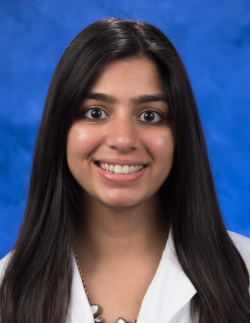By Dolly Patel
“Unlock, press down on the green button, and wait 10 seconds.” I read the instructions for the subcutaneous injection over and over again for what seemed like hours. My hands clammy, I finally took a deep breath, positioned my hand, and heard a loud “click”—a click that would pretty much turn my whole life upside down, but in the best way possible.
We've all heard the cliché sayings about medical school: “it's like drinking from a fire hose” or “it's a roller coaster ride that won't let you off.” Although I can relate to these to some degree, my medical school career was complicated by more than just complex cardiac physiology or biochemical pathways. Little did I know that at the end of my second year, I would go from knocking on a patient's door during a clinical session to sitting in an exam room myself, waiting to be officially diagnosed with psoriatic arthritis.
For almost 2 years, I spent almost every day in pain. I would physically struggle to get out of bed most mornings. I would slowly walk to class, strategically planning to leave my apartment at a certain time, knowing how long it could take me to walk through the hospital, past the library, and to the classroom.
I was able to hide for the most part. Hide the skin lesions on my face with makeup. Hide my limp by walking slowly. Hide my pain by avoiding the stairs. It was surreal to see images in textbooks and read the specific medical terminology used to describe my chronic condition, and compare it to how I actually felt. The buzzwords that were supposed to serve as learning tools only seemed to reduce me down to labels. I did not look at my skin and think “silver scale,” I did not look at my joints and think “pencil-in-cup deformity,” and I did not view psoriatic arthritis as simply a “seronegative arthropathy.”
I began immunosuppressive treatment weeks before the pandemic hit the United States. While still processing this diagnosis and adjusting to new medication, I was now at a higher risk of getting infected. Pulled out 3 weeks into my first clinical rotation, I felt conflicted. I wanted to be able to help care for patients and the community at large, but I also knew that I needed to take extra precautions to take care of myself.
The experiences of this past year have definitely shaped who I am as a medical student, future physician, and person. I have spent a lot of time thinking about how having a chronic condition and being on an immunosuppressant already has and could impact my career in medicine. Although there have been and will be challenges, I also see the perspective I gained.
I realized that I do not want to hide anymore. I want to share my experiences with my future patients. I understand firsthand what it means to have chronic pain. I also understand firsthand what it's like to feel reluctant about trying new medications. I believe I can use my vulnerabilities to better connect and empathize with patients.
I also learned to never take anything for granted. Biologic therapy has truly transformed my life. I feel more like myself, physically and mentally. I am able to exercise and stay active. I would have never imagined being able to stand for 9 consecutive hours during my surgery rotation, or run up and down multiple flights of stairs during my medicine consult rotation.
Lastly, I recognized that it is okay to ask for help. Everyone needs support, and I am thankful to have colleagues, senior residents, and attendings who were patient and understanding, and took time to check in. I continue to actively seek a network of those in health care with similar situations as me because there is comfort in knowing you are not alone.
As I look forward to a career in internal medicine, I strive to study not only the complexities of the illnesses my patients may have, but also the complexities of their lives. I want to truly learn about my patients for who they are, not just the buzzwords associated with them. I am humbled and grateful for each day I have in medicine, and am excited for what lies ahead.

Dolly Patel
Montefiore Medical Center
Primary Care and Social Internal Medicine Resident
Back to the August 2022 issue of ACP IMpact

